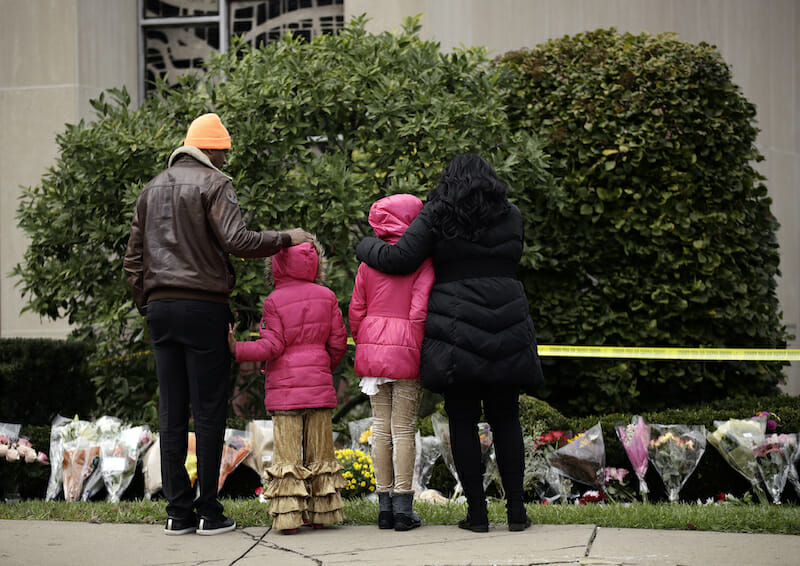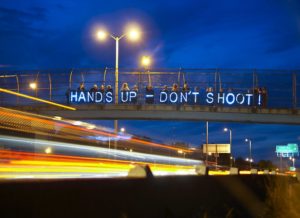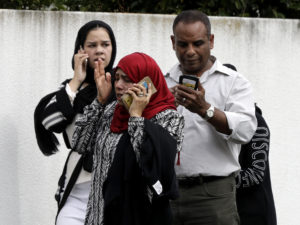Associated Press Blames Shooting Victims, Synagogue’s Open Doors
A tweet by the AP is the latest example in a wave of conspiracy-tinged victim blaming amid tragedy—led by President Trump and conservative pundits. People support each other at a makeshift memorial at the Tree of Life Synagogue in Pittsburgh on Sunday. (Matt Rourke / AP)
People support each other at a makeshift memorial at the Tree of Life Synagogue in Pittsburgh on Sunday. (Matt Rourke / AP)
After President Trump blamed the congregation at the Tree of Life Synagogue in Pittsburgh, where 11 people were shot and killed by an anti-Semitic gunman on Saturday, for not having armed guards, The Associated Press followed suit. In a tweet, the AP insinuated that the victims were somehow responsible for the attack by leaving the sanctuary doors unlocked, critics said.
Some social media users said that the tweet, which said that the shooter, Robert Gregory Bowers, “exploited doors that were unlocked,” unfairly blamed the victims.
Why even include the doors in this headline? What’s wrong with your editors to allow this? What kind of victim blaming nonesense is this?
— spunky girl sidekick, MLIS. (@mrsgeedeck) October 28, 2018
ah yes, it was unlocked doors that did murder, not a person with a mass killing device and an ideology of hate
— 17 Spooky Years Of Forever War (@AthertonKD) October 28, 2018
“exploited doors that were unlocked”
As a child, the “the doors of the church are open” meant safety and community. As a teen/adult, it meant forgiveness and the responsibility to protect, love, and care for others.
I guess this is what terrorism does. Exploit unlocked doors. https://t.co/fL4A2wOUps
— Dr. G is in Research Mode (@AmeliaNGibson) October 28, 2018
The article that the AP tweet was referencing also included a mention of unlocked doors, which was later removed. The article originally read: “During the week, anyone who wanted to get inside Tree of Life synagogue had to ring the doorbell and be granted entry by staff because the front door was kept locked. Not so on Saturday—the Jewish Sabbath—when the building was open for worship.” This carried the implication that perhaps the congregation members could have saved themselves.
Trump said Saturday: “If they had protection inside, the results would have been far better. If they had some kind of protection within the temple it could have been a much better situation. They didn’t. … This is a case where if they had an armed guard inside they may have been able to stop him immediately, maybe there would have been nobody killed, except for him maybe.”
Trump is victim blaming Jewish victims of the Pittsburgh massacre. Nauseating. https://t.co/ulRcgdKUdK
— Owen Jones? (@OwenJones84) October 27, 2018
Disgusting victim-blaming. https://t.co/6R0sSNuskW
— Lee J. Carter (@carterforva) October 28, 2018
A series of packages containing pipe bombs that Cesar Sayoc is accused of sending to several high-profile Democrats and activists also sparked deflection and victim-blaming from the far right.
Trump accused the media of trying to “score political points” in its coverage, even though CNN received packages at its New York office addressed to former CIA Director John Brennan and former Director of National Intelligence James Clapper, both CNN contributors.
“Republicans just don’t do this kind of thing,” said conspiracy theorist Rush Limbaugh about the packages. “Remember every mass shooting there is, the Democrats in the media try to make everybody think right off the bat that some Tea Partier did it, or some talk radio fan did it or some Fox News viewer did it. Turns out it’s never, ever the case.”
NPR correspondent Debbie Elliott noted that during the civil rights movement of the 1950s and ’60s, black people were often blamed by authorities for bombings of their homes and churches.
Diane McWhorter, a historian, added, “The understood motive was that blacks were bombing their own churches and buildings in order to raise money and get publicity for the movement.”
Historian Taylor Branch cited another example of victim blaming in Mississippi in 1964. “Three of the Civil Rights workers were kidnapped by a sheriff’s posse of Klansmen and murdered, and, because the bodies weren’t found, Mississippi officials denied that that segregationists could have done this crime,” Branch said. “First of all, they said there was a hoax. Sen. James Eastland even told that to the president [Lyndon Johnson] on the phone.”
Jewish people have also been blamed for their own tragedies. In 2015, then-Republican presidential candidate and current Secretary of Housing and Urban Development Ben Carson said, “I think the likelihood of Hitler being able to accomplish his goals would have been greatly diminished if the people had been armed.”
Jews did, in fact, fight back during World War II—in particular in the 1943 Warsaw Ghetto uprising, in which resistance fighters used rifles, pistols, a machine gun and homemade bombs against the Nazis. Ultimately, about 40,000 people in the ghetto were either killed or sent to concentration camps following the rebellion.
Brown University historian Omer Bartov said that, ultimately, the Nazi army was difficult to fight. “The [Russian] Red Army lost 7 million men fighting the Wehrmacht, despite its tanks and planes and artillery. The Jews with pistols and shotguns would have done better?”
Some people victim-blame in order to rationalize violence. “In my experience, having worked with a lot of victims and people around them, people blame victims so that they can continue to feel safe themselves,” said Barbara Gilin, a professor at Widener University. “I think it helps them feel like bad things will never happen to them. They can continue to feel safe.”
Your support matters…Independent journalism is under threat and overshadowed by heavily funded mainstream media.
You can help level the playing field. Become a member.
Your tax-deductible contribution keeps us digging beneath the headlines to give you thought-provoking, investigative reporting and analysis that unearths what's really happening- without compromise.
Give today to support our courageous, independent journalists.






You need to be a supporter to comment.
There are currently no responses to this article.
Be the first to respond.